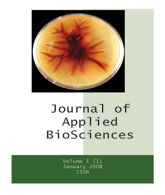Journal of Applied Biosciences (J. Appl. Biosci.) [ISSN 1997 - 5902]
Volume 43: 2942 - 2946. Published July 11, 2011.
Changes of fish liver (Tilapia nilotica) made by herbicide (Pendimethalin)
1 M.I. Abd-Algadir, 2 M.K. Sabah Elkhier and 2 O.F. Idris.
1 Faculty of Education, University of Bakht Er – Ruda, Eld – Dueim, Sudan. Email: emoawia@yahoo.com. Mobile number: 0249915575237
2 Department of Biochemistry and Molecular Biology, Faculty of Science and Technology, Al Neelain University, Khartoum, Sudan.
ABSTRACT
Objectives: This study was carried out in August 2010 and it was aimed to investigate the effect of the herbicide pendimethalin (used as a herbicide in Kenana Sugar Company, KSC) on fish (Tilapia nilotica) serum alanine amino transferase (ALT) and its influence on the food chain at Kenana site.
Methodology and results: Fish samples were collected from four locations. Location 1: Blue Nile Stream (Singa area free from pendimethalin), location 2: Recycled – water (Kenana area - contaminated with pendimethalin), location 3: White Nile Stream (Kenana area - contaminated with Pendimethalin and location 4: Drainage – water (Kenana area - contaminated with pendimethalin). Pendimethalin was extracted from fish fat extracted edible tissues
Conclusion and application: The herbicide Pendimethalin is water pollutant and causes toxicity to fish and other aquatic invertebrates. Toxicity can end up in humans through the food chain. We recommend that water used in agriculture and industry should be completely recycled before reaching rivers and other sources of human drinking water or fishery activities.
FULL PAPER [PDF AVAILABLE HERE]
